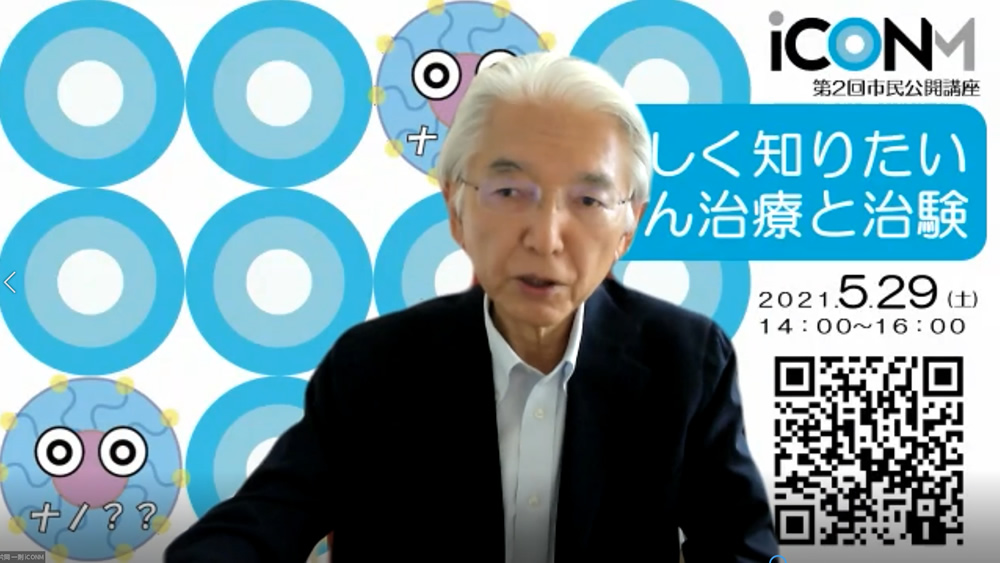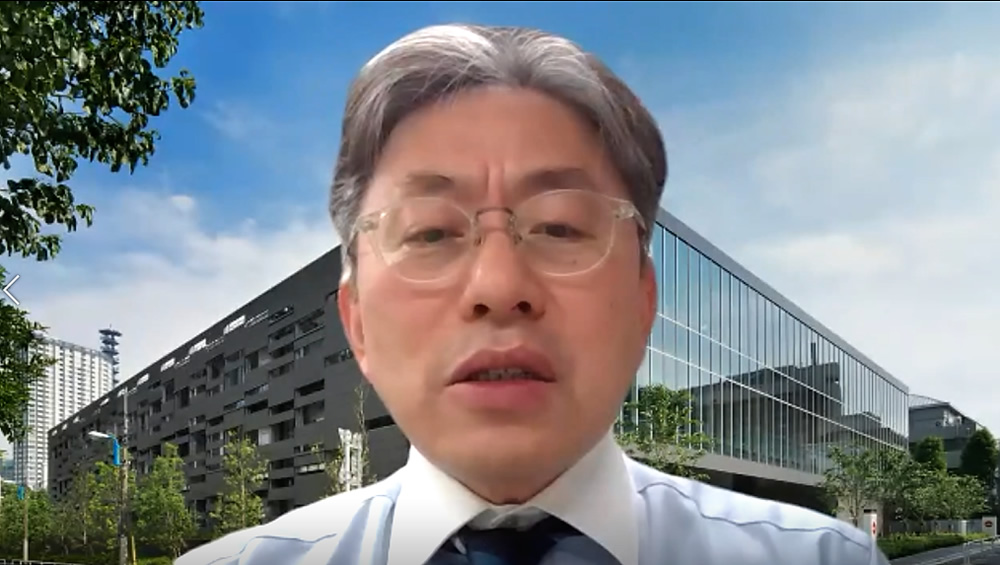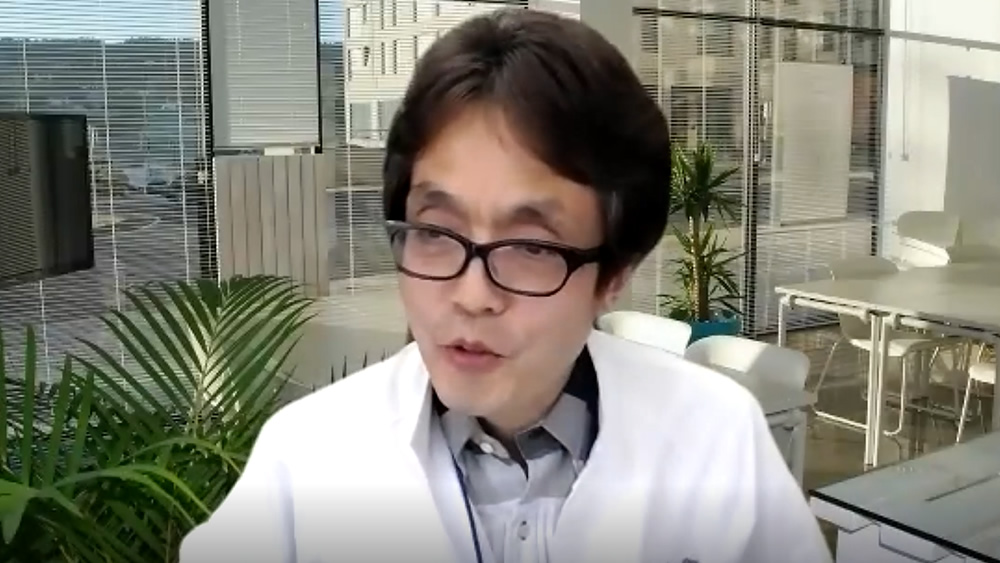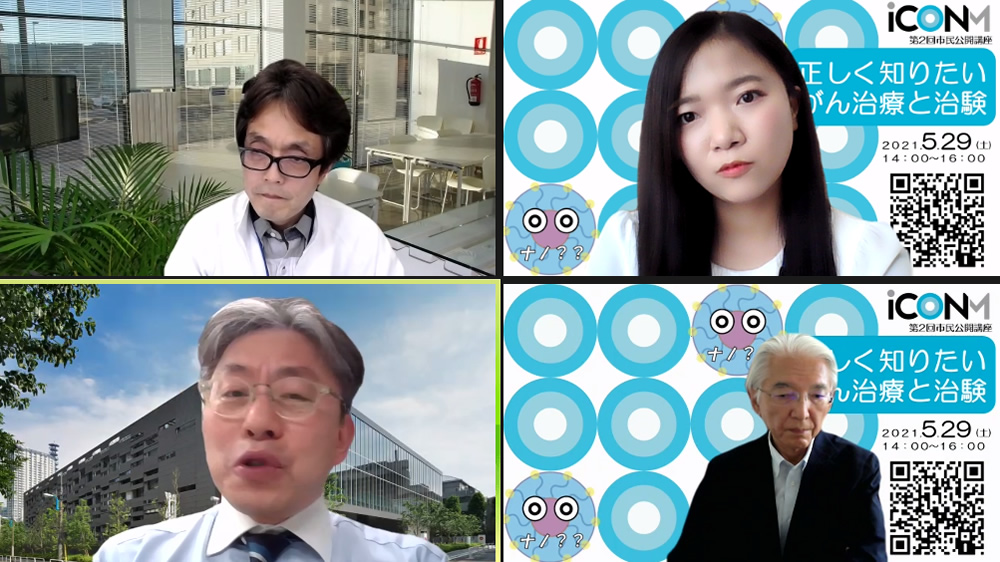News & Topics
The 2nd iCONM Public Lecture was held on May 29 (Sat)
On May 29, 2021, the 2nd iCONM Public Lecture "Cancer treatment and clinical trial we want to know correctly" was held online. More than 200 participants were recruited with the high level of interest in this theme. According to the latest data * from the National Cancer Center Japan, 65.5% of Japanese men and 50.2% of women may be suffered from cancer in their lifetime. In addition, cancer is the leading cause of death in Japan, and in 2019, one in four men and one in six women died of cancer. It is necessary to have correct knowledge and preparation for cancer because it is such close and serious disease. Prof. Kazunori Kataoka, Director General of iCONM, gave a greeting on behalf of the organizer that this event was planned for the purpose of raising the awareness of that. At iCONM, research on nano-DDS, which delivers drugs to targeted tissues in the body, is underway, and some low-dose anticancer drugs with fewer side effects are currently in clinical trials.
From Prof. Yoshihiro Muragaki (brain surgery), Tokyo Women's Medical University Hospital, who took the stage as the first lecturer, we learned the concept of medical risk by taking surgical treatment of brain tumors as an example. Although surgery is a riskier option than any other treatment, it has significant post-treatment benefits (e.g. reduced risk of death and reduced distress). He explained how important “Informed Decision” which means that patients themselves know it and consult with their doctors to decide what is the most important for the patients is. Especially in the case of the brain, there is a risk of losing functions such as movement and language due to excision of the lesion. Therefore, it is necessary for the surgeon to decide during the operation where to put the scalpel, respecting the patient's will. Since there are almost no pain nerves in the brain, it is possible to awaken the patient with the anesthesia turned off and investigate the dysfunction caused by excision of the site by stimulation with a minute electric current. This allowed the surgeon to minimize the excision site. In addition, MRI, which examines the boundary between cancer tissue and normal tissue, and flow cytometry, a device that determines whether tumor tissue is left behind, are installed in the operating room, which is called Smart Cyber Operating Theater (SCOT)**. It is clear that such advanced medical technology is making great strides in reducing the risk of surgery and increasing the benefits of patients.
Prof. Noriyuki Katsumata (Clinical Oncology), the Musashi-Kosugi Hospital of Nippon Medical University, followed the session to present the basic knowledge about clinical trials of anticancer drugs and the essential meaning of "standard therapy". It takes 15 years from the seed discovery identifying a lead compound to the birth of a new drug, and the probability of success is as low as 1 / 10,000, especially clinical trials take the key roles to success. There are two types of clinical trials: "sponsor-initiated clinical trials" conducted by pharmaceutical companies, and "investigator-initiated clinical trials" conducted by investigators using public or private funds. It was stated that it is essential to improve the facilities and environment for conducting investigator-initiated clinical trials in order to advance medical care for diseases that do not fit into the business of companies. In addition, Prof. Katsumata gave a warning that even though no clear therapeutic efficacy has been recognized, there is a lot of information on the Internet that attempts to connect to business by proclaiming those things, and it is very dangerous to easily accept those invitations. "Standard treatment" is the best treatment that has been confirmed to be effective and safe, and clinical trials evaluate how much improvement has been achieved by comparing it. In particular, Phase III clinical trials have been shown to be considered as a therapeutic option.
In the general discussion, many questions were given by the participants. Some of them are shown below along with the answers from the speakers.
Q. How can I participate in a clinical trial?
A. There are many exclusion criteria to participate in clinical trials, and the person who does not meet the criteria can participate. The conditions vary from trial to trial, so you need to get the information first. Information on clinical trials currently underway can be viewed at the following site. If you would like to participate a clinical trial that is not conducted at the hospital you are visiting, please consult your doctor first.
▼ National Cancer Center Japan
https://ganjoho.jp/public/dia_tre/clinical_trial/search2.html
Q. So many information on various cancer treatments is available from Internet. Is it possible to crack down on suspicious medical information?
A. When I tried to see how much online information could be believed, only about 10% of the information was identified as true information (Dr. Katsumata). Although regulated by the "Medical Advertising Guidelines" established by the Ministry of Health, Labor and Welfare (MHLW), the Internet still gives a lot of suspicious medical information. You can correct the information about suspicious websites that may be violating the "Medical Advertising Guidelines" from the following sites.
▼ Medical Facility Patrol Network (MHLW)
http://iryoukoukoku-patroll.com/
▼ About the regulation of advertising at medical institutes on medical affairs law (MHLW)
https://www.mhlw.go.jp/stf/seisakunitsuite/bunya/kenkou_iryou/iryou/kokokukisei/index.html
Q. Is it legal of "individual import of medicines" sites that import foreign medicines?
A. There is nothing to blame in law, but it is a self-funded treatment. In other words, it is legal to import a foreign medicine taking your own risk, but it is advisable to consult with your doctor as it varies depending on race and individual patient's condition (relationship with other diseases, etc.). Importing at your own decision is extremely dangerous.
Q. Is the medication discontinued once the trial is complete?
A. There is a system called “Compassionate Use”, and if the efficacy and safety of investigational drugs are confirmed, the patients who contributed to the trial may be able to continue to take the medication. Ask your investigator as it depends on the clinical trial program.
This time, 90% of the participants experienced cancer themselves or had the patients around them. It is necessary to acquire correct knowledge about "cancer", which is close and serious disease that affects one in two people, and to be prepared on a daily basis so that the best measures can be taken even if cancer is diagnosed. It was an opportunity to learn that it is essential.
Click here for details.
*The latest cancer statistics:
https://ganjoho.jp/reg_stat/statistics/stat/summary.html
**SCOT (Smart Cyber Operating Theater):
https://www.twmu.ac.jp/ABMES/FATS/
Greeting

Prof. Kazunori Kataoka, Director General, Innovation Center of NanoMedicine
Lecture 1: What we want to know about brain surgery - Especially brain tumor -

Prof. Yoshihiroharu Muragaki, Tokyo Women’s Medical University
Lecture 2: What are clinical trials? - How can we receive a best treatment? -

Prof. Noriyuki Katsumata, Musashi-Kosugi Hospital of Nippon Medical School
Let’s question to the speakers!

Upper Left: Prof. Noriyuki Katsumata
Upper Right: Mami Satake (MC)
Lower Left: Prof. Yoshihiro Muragaki
Lower Right: Prof. Kazunori Kataoka






